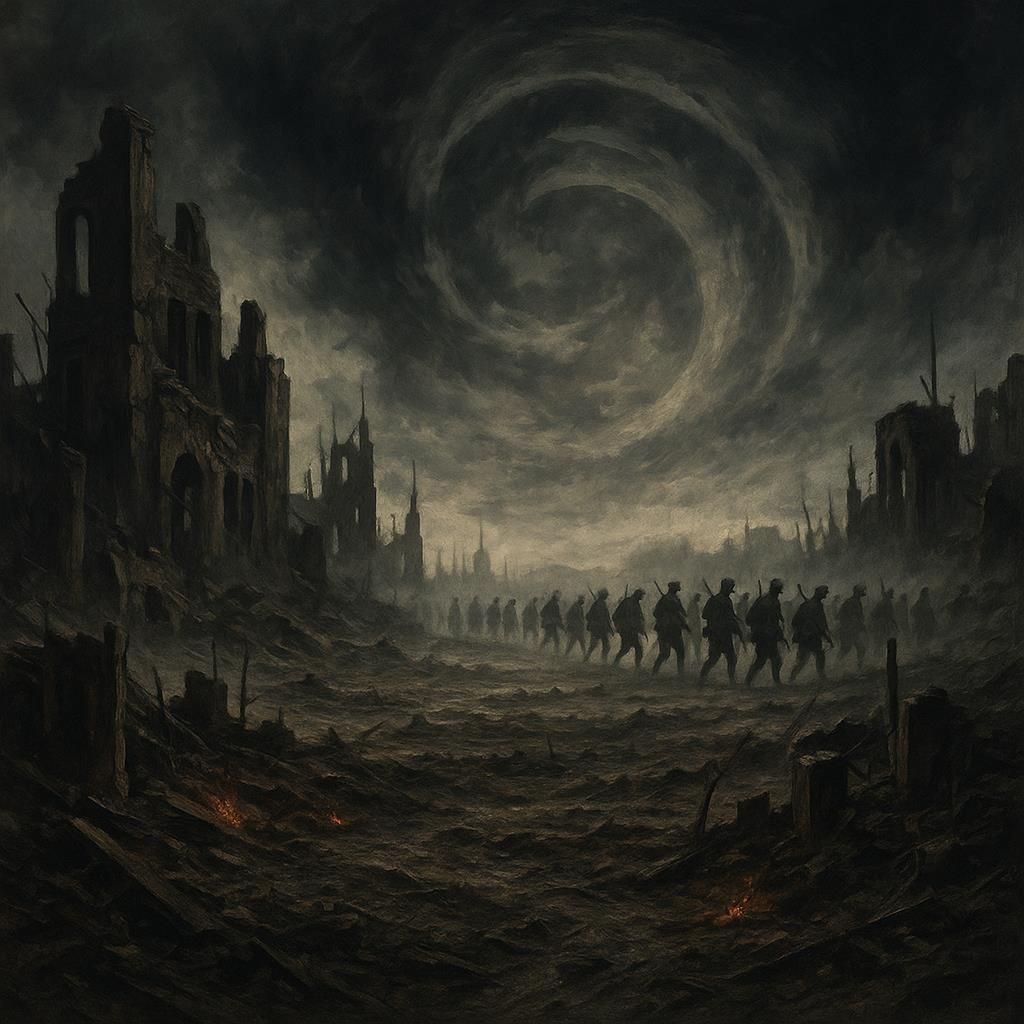Class 9 Beehive Poem Chapter 6 Question Answers - No Men Are Foreign
Q1. How does the poem justify that people in all countries of the world are essentially the same?

Ans: The poet justifies that people in different countries are essentially the same by highlighting the unity in human nature worldwide. The poem begins with the assertion that “no men are strange” and “no countries foreign,” suggesting that all individuals, regardless of nationality, share fundamental experiences and emotions. Every human body functions similarly, needing basic elements like air, water, and sunlight to survive. We all work for a living, using our hands to labour for our daily sustenance. The poet notes that all humans perceive the world through their eyes, which wake and sleep just like ours. Furthermore, emotions such as love are universal and have the power to connect humanity. In peaceful times, all humans thrive, while war brings starvation, destruction, and devastation. Hatred leads us away from peace, and engaging in warfare only pollutes the earth. The poet emphasises that despite the superficial differences that may separate people from different nations, there is a deeper unity that binds us all. Thus, the poet concludes that people around the world are fundamentally the same. We should embrace our shared humanity rather than focus on divisions that separate us.
Q2. ‘Wars have always brought total ruin in this world, yet they are fought repeatedly.’ Discuss.
Ans: Wars have always caused significant destruction and suffering in the world. They are fought repeatedly because of the ambitions and greed of certain leaders who prioritise their own desires for power, territory, or resources. This hunger for domination often leads to conflicts that can engulf entire nations or even the globe. The poet highlights that wars result in complete ruin for both the victor and the vanquished. They devastate economies, destroy infrastructures, and inflict immense human suffering. Historically, wars were often localised; however, in the modern era, they have become global, making them even more destructive and dangerous. The poet reminds us of the horrific consequences of the First and Second World Wars, which left a lasting impact on the world. The bombings of Hiroshima and Nagasaki in 1945 serve as a chilling reminder of the potential for destruction that modern warfare holds. The possibility of another war always looms, and the world remains on edge due to the existence of divisive forces and the ongoing arms race. The poet urges ordinary people to recognise their power and resist manipulation by unscrupulous leaders. The hope for peace lies in the hands of the common people, who must unite to foster a sense of global unity and peaceful coexistence. By viewing the world as a global village, individuals can collaborate to create a harmonious and prosperous future for all.
 Wars have always brought total ruin in this world
Wars have always brought total ruin in this world
Q3. How does the poet James Kirkup prove that no men are foreign? How far is he able to convince his reader about it?
Ans: In the poem 'No Men are Foreign', James Kirkup illustrates that no men are foreign by using both logical and emotional arguments to highlight our shared humanity. The title itself challenges the idea of 'foreigners', suggesting that no one is truly strange or different. The poet seeks to dismantle the barriers that divide us, urging readers to see people from other countries as equals. Kirkup points out our common experiences, reminding us that we all share the same earth, breathe the same air, drink the same water, and are nourished by the same sunlight. These basic needs are universal, transcending nationality. Furthermore, all humans experience similar emotions, such as love and the desire for peace. The poet notes that people from various nations work hard to support their families, just as we do. The poem also addresses the devastating consequences of war, which impacts everyone, regardless of their side. War leads to starvation, suffering, and environmental destruction, affecting the planet we all depend on. By viewing others as foreigners, we create divisions that breed conflict and ultimately harm ourselves. Kirkup makes a compelling case for unity and brotherhood, encouraging readers to recognise the shared humanity that connects us all. The poem calls us to reject the notion of 'others' and embrace a sense of global kinship that transcends national borders. Through his arguments, Kirkup effectively convinces the reader of our interconnectedness and the importance of seeing beyond superficial differences.
Q4. How, according to the poet, the human earth is ‘defiled’ and the innocence of air ‘outraged’?
Ans: According to the poet, the human earth is defiled and the innocence of air is outraged primarily due to the destructive impacts of war. The word defiled indicates the pollution and degradation of the earth caused by human actions, especially the devastation from conflict. When nations go to war, they unleash a torrent of weapons that ravage the natural environment, turning once fertile land into barren wasteland. The explosive force of bombs and other munitions obliterates the land, rendering it unfit for agriculture and causing irreversible damage to ecosystems. The poet highlights the environmental consequences of warfare, noting that explosions and fires release clouds of smoke and ash into the atmosphere. This pollution makes the air difficult to breathe, thus violating its purity, or outraging it, as it becomes tainted with the toxic remnants of war. Once clean and life-sustaining, the air transforms into a medium for disease and death. The harmful gases emitted during conflicts contribute to the spread of illnesses, further endangering the health of survivors. The poet's use of the words defiled and outraged conveys a deep sense of violation, as war strips both the earth and air of their innocence and purity. In the aftermath of conflict, both victors and the defeated must confront the environmental devastation, as the once nurturing earth becomes barren and lifeless.

Q5. A great persons tell us to live cordially and as brothers. But we people tend to fight over trivial issues. Why don’t we live with others harmoniously? What makes us fight and hurt others?
Ans: It is true that many great individuals have encouraged us to live harmoniously and peacefully with one another, as brothers and sisters. These teachings have persisted through the ages, urging humanity to embrace love, tolerance, and unity. Yet, despite these messages, we often struggle to follow their guidance. One major reason for this struggle is our insatiable greed—the relentless pursuit of wealth, power, and status. This desire disrupts our inner peace and leads us away from harmony. However, the root of this disharmony goes beyond greed. Deep-seated social issues, such as discrimination based on caste, religion, ethnicity, and wealth, create unnecessary divisions among people. These divisions are artificial, arising from selfish motives and a need to assert superiority over others. Despite knowing that all human beings are fundamentally equal—after all, we are all creations of the same God—we allow our ego and pride to dictate our actions. This ego-driven mindset often leads us to create distinctions even among family members, allowing petty disagreements and power struggles to drive wedges between us. Consequently, we risk losing the respect and love of those around us. Instead of fostering hatred, we should aim to live together in harmony, embracing tolerance, forgiveness, and a spirit of compromise. By doing so, we can cultivate a peaceful and fulfilling life for ourselves and those in our community.
 Q6. How are we responsible for war? Explain with reference to the poem No Men are Foreign.
Q6. How are we responsible for war? Explain with reference to the poem No Men are Foreign.
Ans: According to the poem No Men are Foreign, every individual shares some responsibility for war. War does not arise solely from the actions of political leaders or military forces; it stems from the hatred and divisions that develop among ordinary people. When we begin to hate our fellow humans—viewing them as strangers, enemies, or 'foreigners'—we contribute to an atmosphere of tension and conflict. This tension can gradually escalate into war if left unchecked. The poet highlights that our negative thoughts and actions towards others lay the foundation for violence and destruction. By dehumanising others or treating them with contempt, we plant the seeds of conflict. Our biased and impolite behaviour, whether driven by prejudice, greed, or a thirst for power, creates a breeding ground for war. If we allow these attitudes to thrive, we directly contribute to the chaos and devastation that war brings. Thus, the poem serves as a reminder that peace begins with each individual. By treating others with respect, kindness, and equality, we can prevent the spread of hatred and stop wars before they start.
Q7. The land our brothers walk upon. Is earth like this, in which we all shall lie!’ What does the poet mean to say the above lines? Explain.
Ans: The poet conveys that the land we walk on is the same earth where we will eventually lie after death. This highlights the idea that we engage in all our activities on this shared land. We obtain food, build our homes, and derive many resources from it. Therefore, the poet questions why we label some people as 'others'. In reality, we all inhabit the same universe, akin to a family. The poet urges us to reflect on the discrimination we create against others and the conflicts that arise from our greed for wealth and power. This desire leads to fighting and harming one another. Ultimately, the poet reminds us that death is a shared fate; nothing we possess will remain ours. In the end, we will all return to the same earth.
Q8. How are we alike? Explain in context with the poem.
Ans: We are all alike in many ways. Our bodies have the same structure, and we all need the same air to breathe, sunlight for warmth, and water for various needs. Our daily routines are quite similar; we wake up in the morning, bathe, have breakfast, and go to work or school. Each of us longs for love and rest at night, waking up to a new day. Since our needs and feelings are the same, it is essential to treat everyone equally, regardless of their colour, caste, region, or gender. We should see each person as our brother or sister. Unfortunately, some self-centred individuals engage in conflict and create divisions that undermine this unity.
|
263 videos|1418 docs|124 tests
|
FAQs on Class 9 Beehive Poem Chapter 6 Question Answers - No Men Are Foreign
| 1. What is the central theme of the poem "No Men are Foreign"? |  |
| 2. How does the poet convey the message of unity in "No Men are Foreign"? |  |
| 3. What literary devices are used in "No Men are Foreign"? |  |
| 4. What is the significance of the title "No Men are Foreign"? |  |
| 5. How does "No Men are Foreign" relate to contemporary issues of globalization and conflict? |  |

















